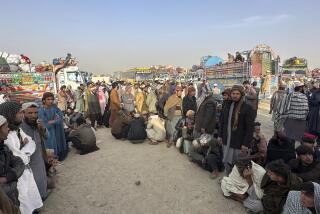Shevardnadze in Pakistan for Talks on Afghan Peace Settlement
- Share via
ISLAMABAD, Pakistan — In an 11th-hour attempt to reach a compromise in the growing crisis in Afghanistan, Soviet Foreign Minister Eduard A. Shevardnadze arrived in this diplomatically strategic capital early today for a day of meetings with Pakistani officials and, possibly, leaders of the Pakistan-based Afghan resistance.
Shevardnadze is the first Soviet foreign minister to visit Pakistan in more than two decades, and Pakistan has been the staunchest supporter of the Afghan guerrillas who have battled the Soviets for nine bloody years.
At an airport press conference, he declined to tell reporters whether he was bringing new proposals to end the strife once the Soviet troops have gone home, according to news reports.
“The Soviet leadership has decided to consult with the government of Pakistan on how best to contribute to restoring peace and tranquility in Afghanistan,” Shevardnadze said on arrival from Beijing, where he went to help arrange the first Sino-Soviet summit in 30 years.
There are many problems between Pakistan and the Soviet Union, he conceded.
“The most acute problem, of which you will be aware, is that of Afghanistan. I will be having intense negotiations with the foreign minister,” he said, referring to his Pakistani counterpart, Sahabzada Yaqub Khan, who was seated next to him.
Yaqub Khan also declined to say whether new proposals were likely to come from Pakistan in Shevardnadze’s talks, which will include a meeting with Prime Minister Benazir Bhutto.
The Kremlin official’s meetings today are seen as the climax of a weeklong international effort to bring Afghanistan’s warring factions together as the Soviet Union withdraws the last of its 115,000 troops in the next few days.
Pakistani and Western analysts in Islamabad, however, said the visit may end up largely symbolic.
Leaders of the Afghan resistance, known as the moujahedeen , disagree completely from the Soviet-backed government of Afghan President Najibullah on the key issue of who should rule Afghanistan after the Soviets end their military involvement there.
Specifically, the moujahedeen have insisted that Najibullah’s ruling People’s Democratic Party of Afghanistan be wholly purged from the government in Kabul before they agree to end the war.
Najibullah himself was just as forceful in a press conference Thursday, saying, “No one can ignore the existence of the People’s Democratic Party as a major power in Afghanistan, and it cannot be excluded (from a coalition government).”
Speaking of the Soviet foreign minister’s visit, one Western diplomat here said, “If Mr. Shevardnadze is still insisting on the PDPA, then it’s just a non-starter.”
Still, Shevardnadze’s meetings with Pakistani officials, which follow a week of intensive diplomatic efforts in Islamabad that included visits by officials from two other key moujahedeen benefactors--Iran and Saudi Arabia, could help solve an even more critical impasse in the war--the issue of arms supplies to the warring Afghan groups.
As an adjunct of the Geneva accords signed last April providing for the Soviet troop withdrawal, the United States and the Soviet Union tacitly agreed to continue furnishing arms to the two sides, an understanding that has become known as “positive symmetry.”
Last week alone, Najibullah’s regular army in Kabul has received large shipments of Soviet rockets and missiles to help his government survive an expected moujahedeen offensive, and eyewitnesses on the Pakistani-Afghan border have seen equally large arms shipments being taken by truck and pack mule in to the rebels, who so far in the conflict have received a total of about $2 billion worth of U.S.-supplied arms under a covert CIA operation aimed largely at driving the Soviets out of Afghanistan.
Pakistan, the moujahedeen’s biggest benefactor, has been the conduit for the arms shipments, which have been coordinated by Pakistani military intelligence. Several Pakistani officials speculated that Shevardnadze may have with him a proposal for “negative symmetry,” which would ban future arms supplies to either side.
Shevardnadze’s visit comes at a critical moment for the divided moujahedeen leadership, which is trying to form a shura, or “national parliament,” on Friday to claim leadership after the Soviets leave. But guerrilla leaders are split over composition of the shura.
In his meetings today, Shevardnadze is expected to repeat Soviet demands that the shura include members of Najibullah’s ruling party, a demand that rebel leaders have flatly rejected. The only compromise offered by the moujahedeen is the allocation of seats to what the rebels call “good Muslims” now in key positions inside Afghanistan.
In related developments, British and French diplomats left Kabul on Saturday after their nations closed their embassies, joining an exodus of Western countries. Britain’s 19 embassy staff members and the four French Embassy workers flew aboard a chartered plane to New Delhi and arrived there Saturday evening.
Also leaving Kabul on Saturday was a convoy of about 40 Soviet military vehicles. On Friday, a huge column of tanks, armored personnel carriers and trucks slipped out under cover of darkness and headed up the Salang Highway, the only surface route between Kabul and the Soviet border.
The chief Soviet negotiator on Afghanistan said Saturday that Soviet troops would complete their withdrawal within four days, well ahead of the Feb. 15 deadline called for under the U.N.-mediated Geneva accords, Iran’s official news agency IRNA reported.
“Soviet forces are due to leave Afghan territory within four days,” IRNA quoted First Deputy Foreign Minister Yuli M. Vorontsov as telling reporters in Tehran, where he is to meet with an Iran-based coalition of eight Afghan rebel groups as well as Iranian officials to discuss the Afghan situation.
More to Read
Sign up for Essential California
The most important California stories and recommendations in your inbox every morning.
You may occasionally receive promotional content from the Los Angeles Times.













